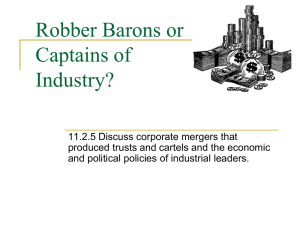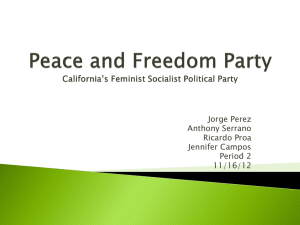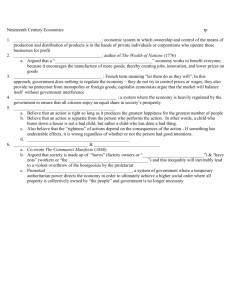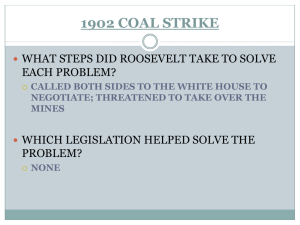Monopolies - my E
advertisement
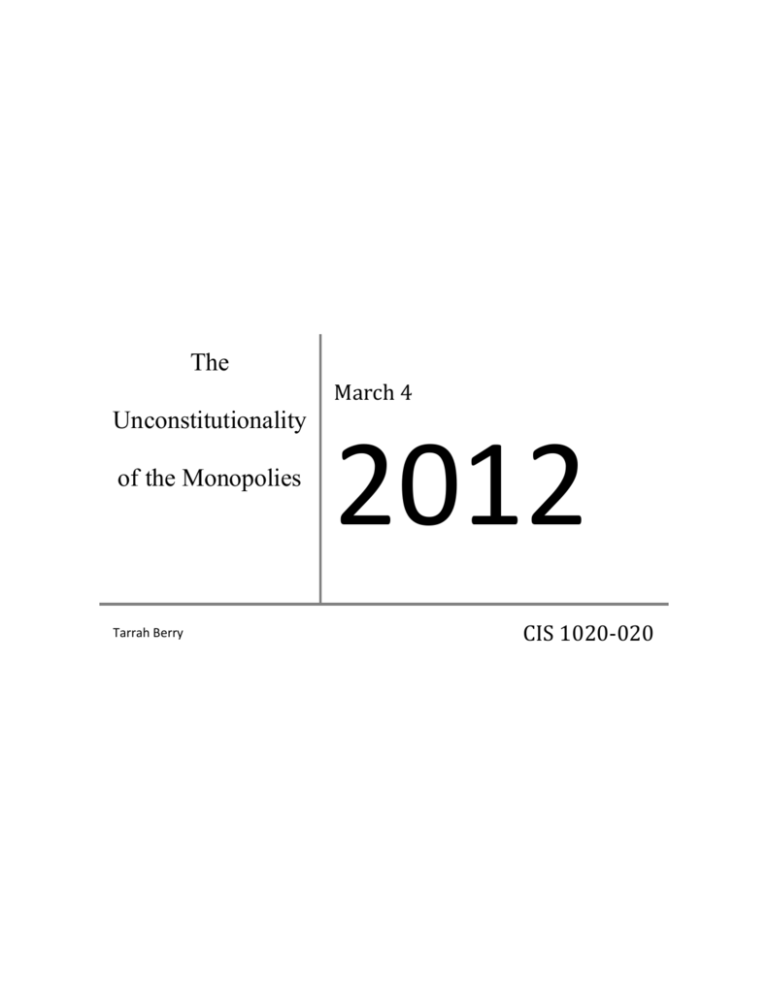
The March 4 Unconstitutionality of the Monopolies Tarrah Berry 2012 CIS 1020-020 Tarrah Berry INTRODUCTION At the turn of the century America’s economy was booming. New technologies and improved transportation made producing and shipping goods more efficient. At the top of this wave of success were a few of the nation’s biggest corporations. These companies had combined with competitors to form huge conglomerates, or monopolies. They were responsible for much of the success of industrialization in the 19th and early 20th century. However, despite the help these monopolies provided in catapulting the American economy, these institutions undermined the founding ideals of this nation, and could have had disastrous effects if left unchecked. Because of the relative silence of the constitution on this matter, that checking was left up to virtuous leaders working for the common good. GOVERNMENT The only words that exist in the constitution relative to business regulation are, “The Congress shall have power . . . To regulate commerce with foreign nations, and among the several states, and with the Indian tribes.” Due to the vagueness of this clause many people, not just monopolies, were opposed to government intervention. They believed that if the government were to meddle in the affairs of business it would 1 Tarrah Berry encroach on the free enterprise system embraced by America (Mansfield, 6). On the other hand, many feared that these monopolies and trusts posed a larger threat to the rights of competition and success long since established in America. The Sherman Antitrust Act, passed in 1890, was the first step Congress took towards playing a more active role in the regulation of businesses. Although the opponents of the trusts saw this as a great victory for the common man, for the first decade of its existence, the Sherman Act was relatively ineffective in controlling the affairs of monopolies. Due to the lack of specifics in defining what a monopoly is, the responsibility of defining antitrust laws largely rested with the Supreme Court. DEPRESSION As a result of the ineffectiveness of the Sherman Antitrust Act, monopolies multiplied and continued to grow. Along with the expansion of monopolies came an increase in unjust treatment of American workers. As depression gripped the nation in the 1890s monopolies treated their employees ruthlessly. Those who were lucky enough to have jobs were not making enough to support their family. Even families in which the father, mother, and children were working could not make ends meet. In some areas of the country unemployment was as high as 20 percent (Mason, 165). This sparked a series of large, very dramatic protests across the country. Those gripped by poverty who gathered at these protests chose to blame the ‘Robber Barons’ and their respective monopolies for their hardships. Herein was the greatest crime of the monopolies. They robbed the people with their ability to manipulate prices, and they left them jobless and poor through their stronghold on labor numbers and wages. If for no other reason 2 Tarrah Berry monopolies were esteemed as evil because they neglected the people this nation was built by and for. More in this sense than any other were monopolies undermining the principles of the American founding. POLICY Among the most important founding ideals of the America is competition. It is seen in the checks and balances on the branches of government. Singular power can lead to singular corruption, and the constitution was supposed to be a safeguard to that. By the time Theodore Roosevelt took over the presidency in 1901, little had been done to combat the leeching of competition by the trusts. Indeed, they had seen much growth during and after the end of the depression in 1897. Roosevelt decided to make a stand against the monopolies. It was this devotion to protecting free enterprise that gave him the nickname the ‘Trust Buster.’ His policy was not to prohibit combinations of companies, but to supervise and, with prudency, control it. In many respects he was an archetype for the President of the United States of America (Jaycox, 247). Roosevelt was a reformer and champion of the people. He was a leader with the high moral values that America was so desperately in need of at that time. In 1902 Roosevelt encouraged the filing of a suit that eventually led to the dissolving of the Northern Securities trust, one of the biggest railroad trust companies in existence at the time. The success of this case won Roosevelt the love of the people, and encouraged Congress to quickly pass new laws to ensure and expedite antitrust legislation such as the Elkins Act in 1903. 3 Tarrah Berry PRESIDENT Although Roosevelt made huge inroads into defeating the malignant trusts, the battle was still not over. Many states followed his example and began to implement Corporation Commissions into their state constitutions. These commissions were modeled after the Interstate Commerce Commission (ICC) started under Roosevelt (Roswenc, 72). When Woodrow Wilson took over as President he had three things on his agenda. One of them was to more fully protect the people from monopolies. He set up the Federal Trade Commission (FTC) and saw the Clayton Antitrust Act passed in 1914. In addition to further crippling monopolies, the Clayton Act also gave more rights to workers. Provisions in the detailed bill affirmed that “the labor of a human being is not a commodity or article of commerce (Jaycox, 393).” Leaders like Wilson and Roosevelt that cared more for the citizens than for their pocketbooks saved America from consequences of monopolies that could have been much more drastic. Presidents Roosevelt Corporation Commissions Cared for Citizens Wilson Federal Trade Commission Cared for Citizens REVOLUTION As this was transpiring in America there were violent revolts being led in Russia. Just as had happened in 19th century France, the severely poor and mistreated Russians induced a bloody revolution in the country. 4 Tarrah Berry Had American leaders been so noble to the cause of the American Constitution and founding, it is highly possible that such a revolution would have occurred in America, effectively ending throwing the nation back into the Human Predicament they had all worked so hard to avoid for over 100 years. MONOPOLIES In many ways the turn of the century was a coming of age for America. 1. It was a time of unheard of success, yet at the same time one of unimaginable poverty. Both of these circumstances were due in large part to the actions of monopolies. 2. Despite the achievements of the American economy in the times of these monopolies, it could not have sustained itself for long. 3. In the end the economy, and possibly even the nation, was saved by virtuous leaders – leaders carrying on the tradition of justice started by the founders of this great nation. 5 Tarrah Berry 6 Tarrah Berry Bibliography Jaycox, Faith. The Progressive Era. New York: Facts On File, 2005. Mansfield, Edwin. Monopoly Power and Economic Performance. New York: Norton & Company, 1974. Mason, Edward S. Economic Concentration and the Monopoly Problem. Cambridge, Massachusetts: Harvard University Press, 1957. Roswenc, Edwin C. Roosevelt, Wilson and the Trusts. Boston: D.C. Heath and Company, 1950. 7




